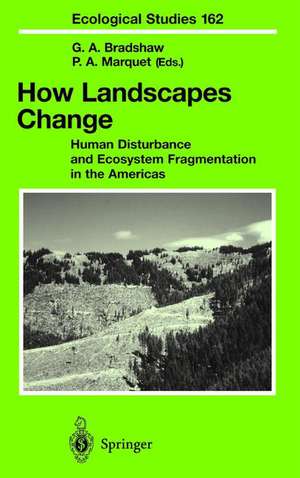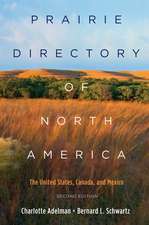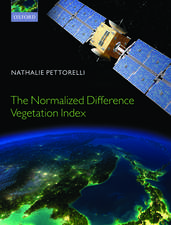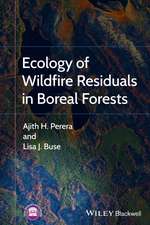How Landscapes Change: Human Disturbance and Ecosystem Fragmentation in the Americas: Ecological Studies, cartea 162
K.L. Ronnenberg Editat de Gay A. Bradshaw, Pablo A. Marqueten Limba Engleză Hardback – 6 dec 2002
| Toate formatele și edițiile | Preț | Express |
|---|---|---|
| Paperback (1) | 1044.27 lei 38-44 zile | |
| Springer Berlin, Heidelberg – 4 dec 2010 | 1044.27 lei 38-44 zile | |
| Hardback (1) | 1231.47 lei 6-8 săpt. | |
| Springer Berlin, Heidelberg – 6 dec 2002 | 1231.47 lei 6-8 săpt. |
Din seria Ecological Studies
- 18%
 Preț: 1118.93 lei
Preț: 1118.93 lei -
 Preț: 553.72 lei
Preț: 553.72 lei - 18%
 Preț: 1680.55 lei
Preț: 1680.55 lei - 18%
 Preț: 1003.38 lei
Preț: 1003.38 lei - 20%
 Preț: 1004.71 lei
Preț: 1004.71 lei -
 Preț: 480.62 lei
Preț: 480.62 lei - 5%
 Preț: 752.26 lei
Preț: 752.26 lei - 15%
 Preț: 643.99 lei
Preț: 643.99 lei - 15%
 Preț: 644.18 lei
Preț: 644.18 lei - 15%
 Preț: 652.49 lei
Preț: 652.49 lei - 18%
 Preț: 789.83 lei
Preț: 789.83 lei -
 Preț: 382.36 lei
Preț: 382.36 lei - 15%
 Preț: 643.48 lei
Preț: 643.48 lei - 15%
 Preț: 646.30 lei
Preț: 646.30 lei - 15%
 Preț: 634.32 lei
Preț: 634.32 lei -
 Preț: 384.86 lei
Preț: 384.86 lei - 18%
 Preț: 789.98 lei
Preț: 789.98 lei - 15%
 Preț: 645.14 lei
Preț: 645.14 lei - 15%
 Preț: 649.39 lei
Preț: 649.39 lei - 18%
 Preț: 1005.43 lei
Preț: 1005.43 lei - 18%
 Preț: 949.23 lei
Preț: 949.23 lei - 15%
 Preț: 649.54 lei
Preț: 649.54 lei - 15%
 Preț: 643.34 lei
Preț: 643.34 lei - 15%
 Preț: 649.71 lei
Preț: 649.71 lei - 15%
 Preț: 638.76 lei
Preț: 638.76 lei - 18%
 Preț: 957.62 lei
Preț: 957.62 lei - 18%
 Preț: 1235.25 lei
Preț: 1235.25 lei - 18%
 Preț: 962.18 lei
Preț: 962.18 lei - 18%
 Preț: 949.23 lei
Preț: 949.23 lei - 15%
 Preț: 660.68 lei
Preț: 660.68 lei -
 Preț: 397.76 lei
Preț: 397.76 lei - 15%
 Preț: 638.24 lei
Preț: 638.24 lei - 18%
 Preț: 942.31 lei
Preț: 942.31 lei - 18%
 Preț: 1232.57 lei
Preț: 1232.57 lei - 15%
 Preț: 651.34 lei
Preț: 651.34 lei - 18%
 Preț: 952.72 lei
Preț: 952.72 lei - 18%
 Preț: 1834.27 lei
Preț: 1834.27 lei - 18%
 Preț: 1229.10 lei
Preț: 1229.10 lei -
 Preț: 423.95 lei
Preț: 423.95 lei - 18%
 Preț: 948.92 lei
Preț: 948.92 lei
Preț: 1231.47 lei
Preț vechi: 1501.79 lei
-18% Nou
Puncte Express: 1847
Preț estimativ în valută:
235.64€ • 256.77$ • 198.56£
235.64€ • 256.77$ • 198.56£
Carte tipărită la comandă
Livrare economică 23 aprilie-07 mai
Preluare comenzi: 021 569.72.76
Specificații
ISBN-13: 9783540436973
ISBN-10: 3540436979
Pagini: 388
Ilustrații: XXI, 362 p.
Dimensiuni: 155 x 235 x 29 mm
Greutate: 0.84 kg
Ediția:2003
Editura: Springer Berlin, Heidelberg
Colecția Springer
Seria Ecological Studies
Locul publicării:Berlin, Heidelberg, Germany
ISBN-10: 3540436979
Pagini: 388
Ilustrații: XXI, 362 p.
Dimensiuni: 155 x 235 x 29 mm
Greutate: 0.84 kg
Ediția:2003
Editura: Springer Berlin, Heidelberg
Colecția Springer
Seria Ecological Studies
Locul publicării:Berlin, Heidelberg, Germany
Public țintă
ResearchCuprins
I Causes and Processes of Landscape Fragmentation.- 1 Biodiversity and Human Intervention During the Last 11,000 Years in North-Central Chile.- 2 Beyond Malthus and Perverse Incentives: Economic Globalization, Forest Conversion and Habitat Fragmentation.- 3 Forest Fragmentation and Biodiversity in Central Amazonia.- 4 Climatic and Human Influences on Fire Regimes in Temperate Forest Ecosystems in North and South America.- 5 Natural Versus Anthropogenic Sources of Amazonian Biodiversity: the Continuing Quest for El Dorado.- II Ecological and Evolutionary Consequences of Fragmentation.- 6 Bees Not to Be? Responses of Insect Pollinator Faunas and Flower Pollination to Habitat Fragmentation.- 7 Implications of Evolutionary and Ecological Dynamics to the Genetic Analysis of Fragmentation.- 8 Forest Fragmentation, Plant Regeneration and Invasion Processes Across Edges in Central Chile.- 9 The Ecological Consequences of a Fragmentation-Mediated Invasion: The Argentine Ant, Linepithema humile, in Southern California.- III Ecosystem Fragmentation: Theory, Methods, and Implications for Conservation.- 10 A Review and Synthesis of Conceptual Frameworks for the Study of Forest Fragmentation.- 11 Reflections on Landscape Experiments and Ecological Theory: Tools for the Study of Habitat Fragmentation.- 12 Spatial Autocorrelation, Dispersal and the Maintenance of Source-Sink Populations.- 13 Patch Dynamics, Habitat Degradation and Space in Metapopulations.- 14 How Much Functional Redundancy Is Out There, or, Are We Willing to Do Away with Potential Backup Species?.- 15 Predicting Distributions of South American Migrant Birds in Fragmented Environments: A Possible Approach Based on Climate.- 16 Habitat Heterogeneity on a Forest-Savanna Ecotone in Noel Kempff Mercado National Park (SantaCruz, Bolivia): Implications for the Long-Term Conservation of Biodiversity in a Changing Climate.- 17 Bandages for Wounded Landscapes: Faunal Corridors and Their Role in Wildlife Conservation in the Americas.- 18 Management of the Semi-Natural Matrix.- Human Disturbance and Ecosystem Fragmentation in the Americas Synthesis and Final Reflections.
Recenzii
"A very useful book for the library." (Bulletin of the British Ecological Society)
Caracteristici
Provides an interdisciplinary overview of the major disruptions sustained by ecosystems in the Americas Creates the basis for a common and comprehensive framework for future research and conservation policy formulation Includes supplementary material: sn.pub/extras











